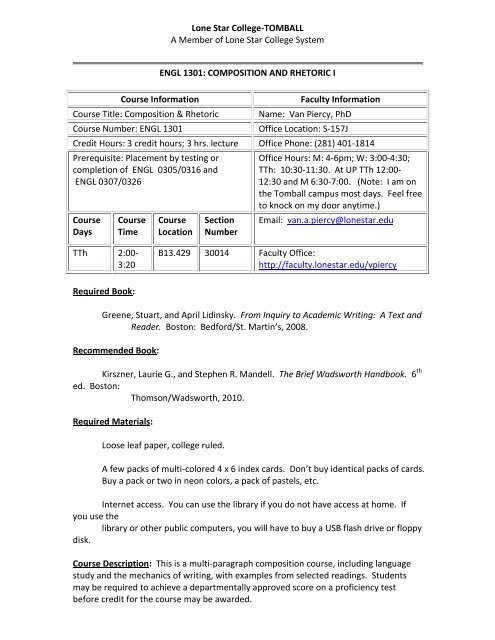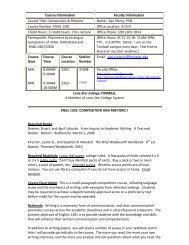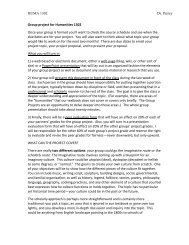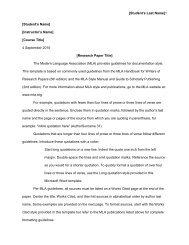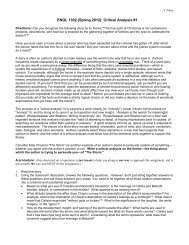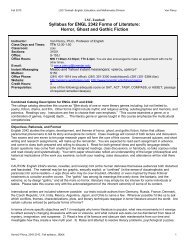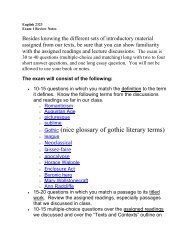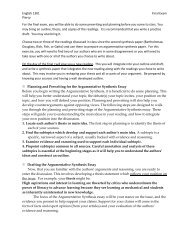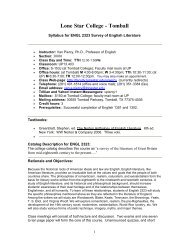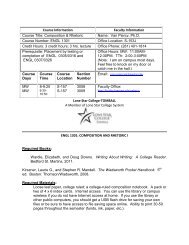English 1301 Syllabus - Van Piercy's Blog
English 1301 Syllabus - Van Piercy's Blog
English 1301 Syllabus - Van Piercy's Blog
Create successful ePaper yourself
Turn your PDF publications into a flip-book with our unique Google optimized e-Paper software.
Lone Star College-TOMBALL<br />
A Member of Lone Star College System<br />
ENGL <strong>1301</strong>: COMPOSITION AND RHETORIC I<br />
Course Information<br />
Course Title: Composition & Rhetoric<br />
Course Number: ENGL <strong>1301</strong><br />
Faculty Information<br />
Name: <strong>Van</strong> Piercy, PhD<br />
Office Location: S-157J<br />
Credit Hours: 3 credit hours; 3 hrs. lecture Office Phone: (281) 401-1814<br />
Prerequisite: Placement by testing or<br />
completion of ENGL 0305/0316 and<br />
ENGL 0307/0326<br />
Course<br />
Days<br />
Course<br />
Time<br />
Course<br />
Location<br />
Section<br />
Number<br />
Office Hours: M: 4-6pm; W: 3:00-4:30;<br />
TTh: 10:30-11:30. At UP TTh 12:00-<br />
12:30 and M 6:30-7:00. (Note: I am on<br />
the Tomball campus most days. Feel free<br />
to knock on my door anytime.)<br />
Email: van.a.piercy@lonestar.edu<br />
TTh 2:00-<br />
3:20<br />
B13.429 30014 Faculty Office:<br />
http://faculty.lonestar.edu/vpiercy<br />
Required Book:<br />
Greene, Stuart, and April Lidinsky. From Inquiry to Academic Writing: A Text and<br />
Reader. Boston: Bedford/St. Martin’s, 2008.<br />
Recommended Book:<br />
Kirszner, Laurie G., and Stephen R. Mandell. The Brief Wadsworth Handbook. 6 th<br />
ed. Boston:<br />
Thomson/Wadsworth, 2010.<br />
Required Materials:<br />
Loose leaf paper, college ruled.<br />
A few packs of multi-colored 4 x 6 index cards. Don’t buy identical packs of cards.<br />
Buy a pack or two in neon colors, a pack of pastels, etc.<br />
Internet access. You can use the library if you do not have access at home. If<br />
you use the<br />
library or other public computers, you will have to buy a USB flash drive or floppy<br />
disk.<br />
Course Description: This is a multi-paragraph composition course, including language<br />
study and the mechanics of writing, with examples from selected readings. Students<br />
may be required to achieve a departmentally approved score on a proficiency test<br />
before credit for the course may be awarded.
Rationale: Writing is a necessary form of communication, and clear communication<br />
promotes success across the academic disciplines and in all professional endeavors. The<br />
primary objective of <strong>English</strong> <strong>1301</strong> is to provide students with the knowledge and skills<br />
that will enhance their written communication and comprehension.<br />
In addition to writing papers, you will read a number of essays in your textbook and in<br />
links I will provide periodically in the course. The more you read, the more your own<br />
writing improves, and the more you analyze and ask questions about what you read, the<br />
better writer you become, as well. The essays I have assigned expose you to many<br />
writers, ideas, styles, and approaches to topics. You will discuss many of these essays in<br />
class and in small groups--studying them carefully to understand exactly what they<br />
say, how they organize and get their points across, what new ideas they convey, and<br />
how their idea communicate within other writers’ frameworks. Then eventually, you<br />
will apply their ideas to your own papers, using some of these writers' essays as a means<br />
of examining an issue.<br />
Course Objectives: The students who complete <strong>English</strong> <strong>1301</strong> should be able to:<br />
focus a topic appropriate to the audience, purpose, situation, and length<br />
of assignment;<br />
use appropriate print and on-line reference material, books, articles, and<br />
government documents;<br />
use and evaluate evidence in support of a claim;<br />
formulate clear and concise thesis statements or propositions;<br />
use effective organization strategies in support of a thesis;<br />
write clear, correct, and appropriate paragraphs that create an essay<br />
which demonstrates a command of unity, coherence, and development;<br />
write clear, correct, and appropriate sentences, avoiding major<br />
grammatical and semantic problems that confuse readers;<br />
incorporate quotations and paraphrases in papers while avoiding<br />
plagiarism;<br />
follow standard guidelines in documenting resources;<br />
analyze a text according to purpose and audience;<br />
respond logically, rather than emotionally, to texts that reflect writers’<br />
diverse backgrounds and values;<br />
Attendance Policy: Attendance at all classes is expected. Should you anticipate an<br />
absence, please notify the professor in advance via email or phone. An excessive<br />
number of absences will prohibit the successful completion of this course and will result<br />
in an “F” in the course. In case of absence, it is the student’s responsibility to obtain<br />
lecture notes and assignments from a classmate. Anyone who has missed more than<br />
four (4) hours of class may be dropped from the course or may receive a final grade of<br />
“F” if the final dropped day has passed. NOTE: You may or may not be dropped for<br />
excessive absences. If I do not drop you, you will receive an “F.” It is your responsibility<br />
to drop the course if you decide not to finish the course.<br />
Maximum number of absences allowed: TTh or MW: 3 class periods<br />
MWF: 4 class periods<br />
Missing Tests: Absences will hurt your grade. If you go over the maximum number of<br />
absences allowed, I’ll deduct three points for your course total at the end of the
semester for each additional day you miss. I do not give make-up quizzes. A student<br />
who is frequently absent or who misses quizzes will not be able to make up all the<br />
points missed, which will result in a low grade.<br />
Any student who misses an in-class paper must make up the in-class paper in the<br />
Assessment Center on the second floor of the library. These papers must be made up<br />
within one week of the test, or the student will receive a grade of zero (0) on the<br />
assignment.<br />
Tardiness: Tardy students create a disruption when they enter class. Therefore,<br />
tardiness is strongly discouraged. Two (2) tardies will constitute one (1) absence. If<br />
tardiness becomes a problem in this class, I will begin locking the door 5 minutes after<br />
the start of class. Students will be prohibited from entering the class after the door is<br />
locked.<br />
Leaving class early: It is disruptive to the class to walk out of class early. If you have an<br />
emergency, you should explain to the professor why you left class early either in person<br />
or through an email. If you know that you must leave class early, you should explain this<br />
to the professor before class on that day.<br />
Cell Phones: It is considered disrespectful and rude for a student’s cell phone to ring<br />
during class. I expect you to turn your cell phones off for the duration of the class<br />
period. If you have an emergency situation which requires you to be available via phone<br />
during my class, I expect you to turn the ringer off before class starts, use the vibrate<br />
feature only, and take the call in the hall. Repeated violation of this courtesy rule will<br />
result in your being asked to leave the class permanently. Also, please do not text<br />
message in class.<br />
Lap Top Computers: Unless you have a special, medically approved accommodation<br />
sheet, please do not open and use lap top computers during class.<br />
Class Participation: The college classroom is a place for adult men and women to come<br />
together with the common purpose of improving their intellectual and academic skills.<br />
All students deserve a classroom environment that is free of interruptions or<br />
distractions that impede learning. Because active participation in class discussions is<br />
essential, it is important that all students are fully prepared for class each day. Any<br />
student who arrives unprepared, sleeps in class, or is disruptive will be asked to leave<br />
class and will be counted absent. Likewise, repeated tardiness and early walkouts are<br />
not acceptable behaviors. If you are asked to leave class, you will need to meet with the<br />
Dean of College Life and with me outside of class before you are allowed back into class.<br />
Withdrawal Policy (Drops): Withdrawal from the course after the official day of record<br />
(see current catalog) will result in a final grade of “W” on the student transcript and no<br />
credit will be awarded. Prior to the official day, it is the student’s responsibility to<br />
initiate and complete a request for withdrawal from any course. Withdrawals are<br />
processed only if the student completes and submits for signature(s) the required<br />
withdrawal form(s) available from the Admissions Office. Students who are TASP<br />
monitored may not be allowed to drop the course.<br />
Various governmental decisions that pertain to withdrawals/drops:
150 hour rule: All students enrolled in Texas public colleges/universities<br />
beginning in Fall 2006 who complete 150 hours of college work must pay out of<br />
state tuition for any credits that exceed those 150 hours. The upshot: Pick a<br />
major and stick with it, or you will be forced to pay out of state tuition for those<br />
extra classes.<br />
3-peat (three-peat) rule: Students who fail or drop a class twice will be forced to<br />
pay out of state tuition the third time he/she enrolls in that class. (and the fourth,<br />
fifth, etc.). The upshot: Don’t fail or drop classes. Schedule yourself to<br />
maximize success.<br />
Six drop rule (SB1231): This one is brand new as of Fall 2007. Any student<br />
enrolled in Texas public colleges/universities who drop six courses during their<br />
entire college career will not be allowed to drop any more classes. See detailed<br />
explanation below. The upshot: Again, schedule yourself to maximize success.<br />
Commit to your schedule.<br />
What Students Are Affected?<br />
All FTIC (First time in college) students enrolled for the first time in a<br />
Texas public higher education institution for the Fall 2007 semester. Dual<br />
credit, ESL, and developmental studies students are not included.<br />
Drop vs. Withdrawal<br />
SB1231 stipulates “dropped” courses which at LSCS are referred to as<br />
“withdrawals.” Withdrawals occur between official day and the posted<br />
withdrawal day. Drops/withdrawals prior to official day are not<br />
considered “dropped” courses and are not posted on the transcript.<br />
(Explanation: School starts on January 14, 2008. However, the official<br />
day of record is not until January 28 th . Therefore, if you enroll in a course<br />
and decide to drop it before Jan. 28 th , it doesn’t count against you as a<br />
drop. After the official day of record, it does. One bit of confusion stems<br />
from the fact that what the legislature is calling “drops” the Lone Star<br />
system calls “withdrawals”.)<br />
Here is the quick rundown with regard to dates:<br />
August 25-September 8: Dropping doesn’t count against you, but<br />
you only have two weeks to decide.<br />
September 9-November 7: You can drop, but it will count against<br />
you as per the Six Drop Rule.<br />
November 8th to the end of the semester: You can’t drop at all.<br />
How is the Law Applied?<br />
Students beginning higher education in Fall 2007 in a Texas public<br />
higher education. All students previously enrolled are not impacted.
All FTIC students who dropped a course during the Fall 07 semester<br />
have been administratively waived and their drops will not count<br />
toward the six (6) drop limit.<br />
Courses dropped effective with the winter 2007 mini-mester will be<br />
counted toward the six (6) drop rule.<br />
What Is A Drop/Is Not A Drop?<br />
Classes dropped after official day through the withdrawal date are<br />
considered drops.<br />
Grades of IP will not be considered a drop since they are an earned<br />
grade.<br />
Classes dropped prior to official day are not considered drops and do<br />
not appear on the transcript.<br />
See your academic advisor for more information.<br />
Reference Materials and Resources: Tomball College offers excellent tutoring services<br />
in the Extended Learning Center, which is presently located in the library. If you are<br />
having trouble in my class, I urge you to do two things:<br />
1. Discuss your difficulties with me and get my input.<br />
2. Visit the Extended Learning Center and take advantage of the tutor coaches<br />
and the Writing Center. These services are free of charge and exist to help<br />
you achieve your goal of being a successful college student.<br />
ELC tutoring times for <strong>English</strong>: See the ELC Coordinator on the 2 nd floor of the library.<br />
Code for Academic Honesty: The District upholds the core values of learning: honesty,<br />
trust, respect, fairness, and accountability. We promote the importance of personal and<br />
academic honesty. We embrace the belief that all learners---students, faculty, staff, and<br />
administrators—will produce their own work and must give appropriate credit to the<br />
work of others. No fabrication of sources or unauthorized collaboration is permitted on<br />
any work submitted within the District. Even inadvertent cheating or plagiarizing must<br />
be avoided by careful documentation of other people’s ideas and language. Penalties<br />
for plagiarism can include failure of an assignment or failure of a class. Please refer to<br />
the Academic Honesty and Student Success brochure for more information at<br />
http://www.lonestar.edu.<br />
Honors Credit:<br />
Students can earn Honors credit in this course by completing an Honors by Contract.<br />
Contracting allows a student to receive Honors credit for a non Honors course by<br />
completing work that is above and beyond, even different from, what is required of<br />
the other students in the course. An Honors by Contract is one of three ways<br />
students may receive Honors Credit. Once you complete the Honors by Contract<br />
form, you are expected to honor this agreement. This means that you fulfill all<br />
regular course assignments as well as complete the Honors Project outlined in the<br />
contract. We will meet periodically throughout the course of the semester to<br />
evaluate your progress. You will be expected to present your Honors Project to the<br />
class at the end of the semester to receive Honors Credit. A student can earn Honors<br />
Credit without concurrent membership in the Honors Program. Students will receive
an H designation on their college transcript next to the course they earned Honors<br />
Credit in.<br />
More information is available at the Honors Program website:<br />
http://www.tomballcollege.com/goto/honors<br />
ADA Statement: If you require reasonable accommodations because of a physical,<br />
mental, or learning disability, please notify the professor of this course as soon as<br />
possible and preferably before the end of the first two weeks of class to arrange for<br />
reasonable accommodations.<br />
Equal Opportunity Statement: Check the district catalog for the statement concerning<br />
the equal opportunity principle.<br />
Guaranteed Graduate Policy: Check the District Catalog for the statement concerning<br />
guarantees for graduates.
The Nuts and Bolts of this Class<br />
Essays/Papers: You will write a total of six papers in this class. These papers will take<br />
the following forms:<br />
Type of Essay<br />
Length<br />
Source<br />
Requirement<br />
Diagnostic 500 words 1 source<br />
Revision of Diagnostic 750 words 1 source<br />
Synthesis Paper 1<br />
Mini-research Paper/Extended<br />
Synthesis (Synthesis 2)<br />
Research Paper<br />
Final Exam<br />
750 words<br />
750 words<br />
1200-1500<br />
words<br />
600 words<br />
At least 2<br />
sources<br />
At least 3<br />
sources<br />
At least 5<br />
sources<br />
To be<br />
determined<br />
Point<br />
Value<br />
50<br />
points<br />
100<br />
points<br />
150<br />
points<br />
150<br />
points<br />
200<br />
points<br />
100<br />
points<br />
Total Final<br />
Value %<br />
5%<br />
10%<br />
15%<br />
15%<br />
20%<br />
10%<br />
Research Paper (20% of final grade It is reflected in the chart above): The research<br />
paper is the culminating activity in the course. Every assignment, every paper we do in<br />
<strong>English</strong> <strong>1301</strong>, is preparation for the research paper project. The professors of the<br />
college courses you take after <strong>English</strong> <strong>1301</strong> will assume that you know how to write a<br />
research paper and will make their assignments accordingly. The minimum<br />
requirements for this project are as follows:<br />
a. You must complete the preliminary work associated with the project.<br />
b. The paper must be at least 1500 words long, not including the Works Cited<br />
page.<br />
c. The paper must incorporate at least 5 credible outside sources.<br />
NOTE: This project will be given in stages. Successful completion of each stage is crucial<br />
before moving on to the next stage. All work done that is associated with the research<br />
paper is worth 10% of the total final grade. The paper itself is worth 20% of the total<br />
final grade.<br />
Failure to turn in any or all of the work preceding the final draft of the research paper<br />
will result in a “0” (zero) on the entire project.<br />
Because the research paper is the culminating activity in <strong>English</strong> <strong>1301</strong>, failure to turn<br />
in a research paper will result in a failing grade in the entire course.<br />
Plagiarism: Plagiarism is a serious issue in all <strong>English</strong> classes. In a nutshell, plagiarism<br />
involves intentional and unintentional copying of any written or unwritten material or<br />
idea without attributing that material or idea to the original source. This includes<br />
material retrieved from the Internet.<br />
Any student who plagiarizes is telling me that he/she would rather cheat to get a good<br />
grade than learn the material to earn the grade. Any student who turns in a plagiarized<br />
paper before the “drop date” will be asked to drop the course or receive an “F” in the
course. Any student who turns in a plagiarized paper after the “drop date” will<br />
receive an “F” in the course. (Refer to the “Code for Academic Honesty” for more<br />
details on plagiarism). Keeping track of drop dates is your responsibility, not mine.<br />
Turning in Assignments: All work due is due at the beginning of each class unless<br />
otherwise specified. Work that is turned in the day it was due but after the class period<br />
in which it was due will suffer a 10 percentage point penalty. Work that is turned in the<br />
next day will lose 20 percentage points. I will deduct 20 percentage points every day<br />
after that.<br />
Late work can be put in my mailbox in the South hallway at Tomball College. All work<br />
put in my mailbox must be stamped with the time and date. There is a time/date stamp<br />
machine in the mailroom. I will assume that any work not stamped and dated was<br />
turned in the day that I pick it up. In these cases, the maximum deduction of points will<br />
be applied.<br />
Final Exam: A final exam will be given and is listed on the paper chart above. It cannot<br />
be made up.<br />
Other graded work (25% of total final grade):<br />
Homework: You will be given homework in the form of readings. You will be tested on<br />
these readings. You will also be asked to conduct research, complete writing<br />
assignments, and complete other types of assignments. Some homework will be graded;<br />
others will not.<br />
Quizzes: You may be given quizzes on the readings. These would simply be reading<br />
check quizzes to test your understanding of the material.<br />
Research-related work and other paper preparation “pre-writing” assignments: Each<br />
paper that requires research will also require certain preliminary work, such as:<br />
1. Evidence of Research<br />
2. Note cards<br />
3. An outline<br />
4. A draft Works Cited page<br />
Not all papers will require all of these assignments. The points for this work will fall into<br />
this “other graded work” category.<br />
Assignments How many % weight Total<br />
Major Papers excluding research paper 4 15% each 60%<br />
Research paper 1 20 % 20%<br />
Other graded assignments (homework, quizzes, etc.) undetermined 20% 20%<br />
Grand total 100%<br />
Grading Scale: rounding up at .5:<br />
A 90-100 (89.5-100)<br />
B 80-89 (79.5-89.4)<br />
C 70-79 (69.5-79.4)
D 60-69 (59.5-69.4)<br />
F 59.4 and below<br />
A copy of this syllabus can be found online at the following address:<br />
http://faculty.lonestar.edu/syllabus/menu/student.php<br />
Spring Semester 2010
Tentative Daily Schedule for <strong>English</strong> <strong>1301</strong><br />
(Spring 2010 Jan 19-May 16)<br />
NOTE: All reading and writing assignments are to be completed before class on the date<br />
on which they appear on the schedule. It is a good idea to mark the due dates of major<br />
assignments from all your classes so that you can see what weeks will be especially busy.<br />
Also, bring your textbook to class whether or not reading is assigned for a particular day.<br />
Unless otherwise indicated, all readings are from Greene and Lidinsky, From Inquiry to<br />
Academic Writing (FIAW).<br />
WEEK 1 Introduction and Unit I: “Body Images, Gendered Pain and Pleasure in Mass<br />
Media”<br />
Jan. 19 Introduction to the course; examine syllabus and course schedule. Introduction<br />
to summary writing. Go over criteria of a good summary. Cf. paraphrase. Discuss<br />
plagiarism and academic writing expectations. Preview FIAW pp. 1-8. Assign text for<br />
diagnostic summary: part of Kilbourne, “‘Two Ways A Woman Can Get Hurt’: Advertising<br />
and Violence” (592-600); ch. 7, “Writing a Summary,” FIAW pp. 125-137. Handout<br />
pages 213-215 Wadsworth and pages 347-349 in Strategies<br />
Jan. 21 In-class diagnostic essay (1st draft of Summary 1); Kilbourne, “‘Two Ways A<br />
Woman Can Get Hurt’: Advertising and Violence” (FIAW 592-600)<br />
WEEK 2<br />
Jan 26 Go over in-class diagnostic essay; discuss complete version of Kilbourne (FIAW<br />
592-614) and “Introduction: What Is Academic Writing?” FIAW pp. 1-8 and ch. 7, pp.<br />
125-137, “Writing a Summary.”<br />
Jan. 28 Discuss “Starting with Inquiry,” FIAW pp. 11-15. Do exercise 1, p. 14, “Find an<br />
advertisement for a political campaign….” But adapt for Kilbourne: Students need to<br />
bring a sample advertisement with their notes on it to class. Discuss in groups; share<br />
best analyses on overhead. Also, read “From Reading as a Writer…,” pp. 25-38.<br />
WEEK 3<br />
Feb. 2 Discuss Hirsch (pp. 29-32) and introduce rhetorical analysis.<br />
Feb. 4 Begin work on Scholes, “On Reading a Video Text” (pp. 371-376).<br />
Annotation and rhetorical analysis. Read the editors’ introduction to Scholes essay<br />
on page 370-371, and the essay itself, and write a rhetorical analysis of one<br />
paragraph (use guidelines in the FIAW, ch. 2, pp. 38-39 and p. 43; see exercise on<br />
bottom of page 42.).<br />
WEEK 4<br />
Feb. 9 The writing process, FIAW, pp. 21-4. Read Isasi-Diaz, “Hispanic in America,” pp.<br />
40-42 and Barbara Ehrenreich, “Cultural Baggage,” pp. 43-46. Email me a link to a video<br />
(e.g., Youtube) that you think highlights Scholes’ ideas on video analysis. Be prepared to<br />
discuss the Isasi-Diaz, the Ehrenreich, and the Scholes.
Feb. 11 Review Chapter 7, FIAW, 125-38: Discussion of paraphrase and summary.<br />
Read “From Revising to Editing: Working with Peer Groups,” FIAW pp. 227-233.<br />
Bring typed draft of summary to class; peer review of summary draft; paper<br />
format check.<br />
WEEK 5<br />
Feb. 16 Summary 1 due; Chapter 7: Synthesis, FIAW pp. 138-150. Discussion of modes.<br />
Five paragraph theme essay. Wadsworth handout, p. 223; Wadsworth exercise 1, pp.<br />
218. Intro to synthesis.<br />
Feb. 18 NO CLASS—Conference day<br />
WEEK 6<br />
Feb. 23 Editor’s introduction to Giroux, “Children’s Culture and Disney’s Animated<br />
Films,” FIAW pp. 567-568 and the last half of the essay, pp. 580-590. Re-read<br />
chapter 7 FIAW: Synthesis, pages 138-150; Synthesis 1 worksheet due.<br />
Feb. 25 Read Ch. 5, “From Formulating to Developing a Thesis” FIAW pp. 83-94 and 98-<br />
104. Bring your annotations (on a separate piece of paper) of the student essay on 98-<br />
102 to class. Handwritten is okay.<br />
WEEK 7<br />
March 2 Read chapter 4: “From Identifying Issues to Forming Questions,” FIAW pp. 65-<br />
82. (Bring three typed copies of your draft); Synthesis 1 draft due; peer review of<br />
synthesis draft; read ch. 10 “From Revising to Editing,” FIAW pp. 233-248.<br />
March 4 Read Loewen “The Land of Opportunity,” FIAW pp. 168-172. Homework: bring<br />
to a class a rhetorical analysis of a paragraph of Loewen.<br />
WEEK 8<br />
March 9 Read: Chapter 6 “From Finding to Evaluating Sources,” FIAW pp. 113-124; and<br />
read bell hooks, “From Teaching to Transgress: Education as the Practice of Freedom,”<br />
FIAW pp. 293-308.<br />
March 11 Video clip: “Between the Drafts”; reading: TBA (handout) Synthesis 1 due.<br />
Read: Heath selection, “From Protean Shapes in Literacy Events…” FIAW pp. 95-9.<br />
Week 9<br />
March 15-19 Spring break.<br />
Week 10<br />
March 23 Re-read chapter 5, pp. 83-104; pay particular attention to pp. 89-94 and the
Read Kozol “Still Separate, Still Unequal: America’s Educational Apartheid,” FIAW pp.<br />
308-330.<br />
March 25 Discuss next project; review synthesis with library research, Chapter 6 “From<br />
Finding to Evaluating Sources,” FIAW pp. 105-113. Review plagiarism and correctly<br />
integrating quotations: Ch. 7 FIAW pp. 150-156; review also difference between primary<br />
and secondary sources, and scholarly and popular sources, FIAW 107-112. Be prepared<br />
for a quiz on these topics. Meet in class: Library: Introduction to library and electronic<br />
research. Synthesis 2 worksheet due.<br />
WEEK 11<br />
March 30 Edmundson, “On the Uses of a Liberal Education,” FIAW pp. 277-292.<br />
Homework: bring written answers to “Reading Rhetorically” questions 1, 2, and 3, pp.<br />
291-292; Synthesis 2 draft due, peer edit. Read chapter 9 “From Introductions to<br />
Conclusions,” FIAW pp. 201-226. Discussion of Research Paper.<br />
April 1 Citation practice. Finding sources. Database searches. Discuss research<br />
objectives. Review “Sample MLA-Style Research Paper” (handout). Synthesis 2 due.<br />
WEEK 12<br />
April 6 Reading TBA. Evidence of research due (turn in a print-out of results from a<br />
catalogue or database search you do through our library)<br />
April 8 Library work. Meet in class.<br />
WEEK 13<br />
April 13 Note cards (10 total) due; (April 13: Last day to drop with a “W”)<br />
April 15 Selfe “Lest We Think the Revolution Is a Revolution: Images of Technology and<br />
the Nature of Change,” FIAW pp. 783-797.<br />
WEEK 14<br />
April 20 draft Works Cited page due.<br />
April 22 Reading TBA.<br />
WEEK 15<br />
April 27 Draft of Researched Position paper due (typed, including works cited); peer<br />
review; Note Cards (20 total) due.<br />
April 29 Introduction to critical analysis.<br />
Week 16<br />
May 4 Final copy of Researched Position Paper due; FIAW pp. 181-189.
May 6 Writing argumentative essays, continued. Look at sample arguments. FIAW ch. 9<br />
“Using Logic”; memorize the logical fallacies in this chapter. Writing Essay Exams;<br />
Introduction to ENGL 1302; Final exam assignment.<br />
WEEK 17 (Final exam week, May 10-14)<br />
May 11<br />
2:00 - 3:50 am


